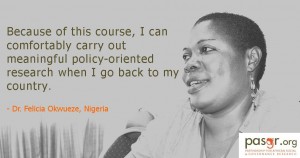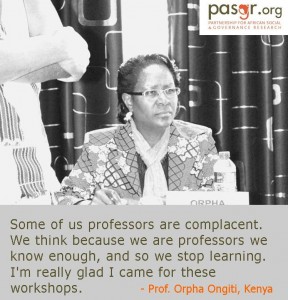Contact Info
- 6th Floor, I & M Building 2nd Ngong Avenue, Upper Hill
- +254 (0)20 2985000; +254 (0)729 111031 / +254 (0)731 000065
- info@pasgr.org
- Office Hrs: Today 9.00am to 6.00pm

Between March 30 and April 15, 2016, PASGR’s Professional Development and Training programme ran a suite of research design and methods modules. The training started with a 10-day Advanced Research Design (ARD) course that consisted of modules in: Designing Social Inquiry, Critical Policy Engaged Research, and Introduction to Multi-Methods Research. The ARD was followed by the Ethnographic and Interpretive Methods module.
The training was held at the KCB Leadership Training Centre in Nairobi, Kenya. The serene, expansive, lush environment of the centre with the Ngong’ Hills in the horizon was conducive for teaching and learning, devoid of interruptions that are often present in a town setting.
Hailed by participants as “transformative and life changing”, this training has continued to catch the attention of researchers and policy actors in Africa and beyond, with over 100 applicants for the 40 spaces available.
Participants included post-doctoral researchers and doctoral students wanting to improve their research projects; experienced university professors and lecturers seeking to acquire new approaches to research for their projects and to better support their graduate students; and policy actors who are directly involved in policy research. There was a fair regional representation with participants coming from Ghana, Nigeria, Madagascar, Cameroon, Uganda, Kenya, Tanzania, South Africa, South Sudan, and Botswana. It was an achievement to have male and female participation at almost the same level.
 Rigorous selection and learning process
Rigorous selection and learning process
What makes this training unique is the rigorous process to ensure that quality is maintained. This starts with a stringent selection of participants; they are ranked according to the concept paper and motivation statement they submit with their applications. Participants work on their own concept papers during the training.
In the just concluded sessions, it was observed that the quality of participants was very high. Instructors noted that participants were generally “remarkable and questioning”, committed, open to ideas and engaged throughout. This was evidenced by the positive progression of their concept papers by the end of the training.
Upon selection, participants were taken through a pre-training week of online facilitation where the programme coordinator engaged them with key course materials and reflections using Moodle, a learning management system. Participants were therefore familiar with the course content when they arrived at the workshop.
Unique pedagogical approach
The actual ARD training was delivered by a team of seven instructors who have completed the course and then trained as facilitators. To ensure quality of content and pedagogy, instructors held virtual meetings way before the actual training to review the modules and fine-tune them using feedback received in previous sessions. Online engagement was followed by a two-day pre-training meeting to harmonize content. The trainers also refreshed themselves on the innovative alternative pedagogy that combines practical, problem based, group work and peer learning approaches with the use of innovative learning resources such as e-case and animation. Peer learning and group discussion enrich the learning process through collective experiences.
The Ethnographic and Interpretive Methods module followed the same approach. Facilitated by a senior researcher at the Overseas Development Institute – ODI – and a Kenya-based Professor, the module integrated real ethnographic experience where participants visited nearby markets, public transport terminus and a dumpsite and carried out participant observations and interviews. Participants practiced knowledge acquired in the training, gaining valuable experience of what to expect in the field as an ethnographer.
PASGR is keen to develop a strong body of African instructors and uses different approaches to achieve this objective. For example, emerging talents discovered during the training are further trained to become instructors. This time, five alumni identified in previous courses were taken through a rigorous pre-workshop process during which they individually read and reflected on the content and pedagogical application of key course materials. During the training, they were assigned group facilitation sessions. This level of involvement equipped them with experience required to take part in future sessions as instructors.
All the modules have been developed in partnership with the Institute of Development Studies at University of Sussex, UK, who are responsible for quality assurance.
The next suite of courses will be delivered in November 2016. Sign up at https://www.pasgr.org/news-events/newsletters/ to receive an email on the next call for applications.
A4EA AAU advanced research design African universities agriculture Applied Quantitative Methods APSP ARD CABE call for applications cash transfers COVID-19 employment energy EOI Featured higher education IDS INCLUDE Job opportunity LEAP Africa MMRC MRPP opportunities opportunity PAMOJA TRUST partnerships PASGR PDT pedagogy PedaL press release professional development and training professional training public policy Research research methods scholarships social protection Social sciences University of Ibadan University of Pretoria utafiti sera vacancy Youth employment

6th Floor, I & M Building
2nd Ngong Avenue, Upper Hill
P.O. Box 76418-00508
Nairobi, Kenya
Email: info@pasgr.org
Tel: +254 (0)20 2985000;
+254 (0)729 111031 / +254 (0)731 000065
Legal counsel provided by Hurwit & Associates and Muthoga Gaturu & Co. Advocates